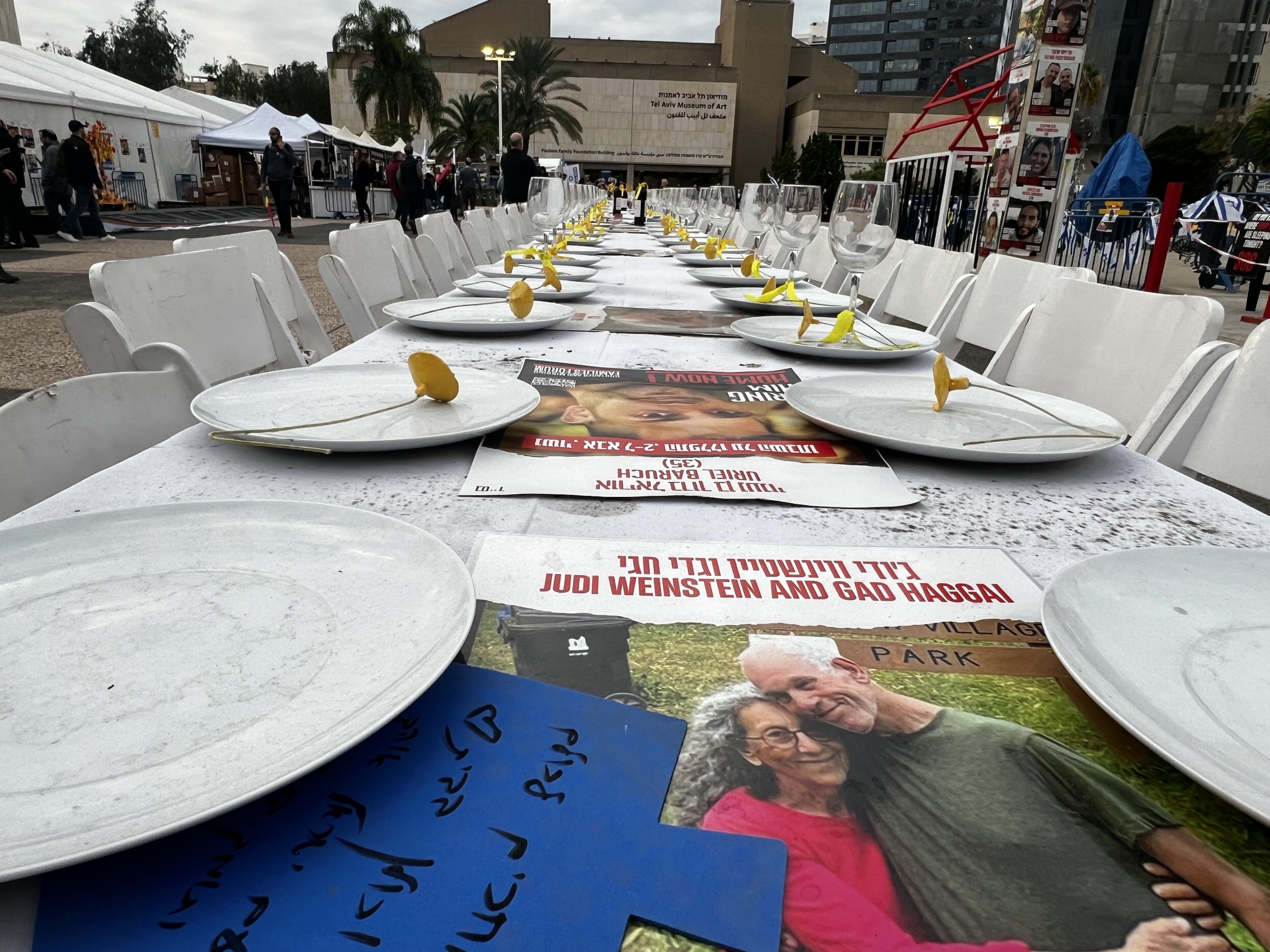DAY 1: AS RABBI JONATHAN AARON TRAVELS THROUGH ISRAEL ON HIS SABBATICAL, HE WRITES ABOUT HIS EXPERIENCE DURING HIS VISIT.
Right now, we are on a bus heading down to the “Gaza Envelope” in Israel, the area that borders Israel and Gaza where the attacks took place. I wanted to share three moments that happened yesterday in Jerusalem and Rishon Letzion near Tel Aviv.
Upon arrival, I went to dinner with friends and a guest, a woman named Sharon, who is a guide for trips to Israel (she was a friend of one of my friends). It was an emotional conversation about what she has endured on and since October 7. There was one thing that she said that really caught my attention, and I’ve been thinking about it ever since. We were discussing the impact of the attack on the Israeli psyche, and someone mentioned that the whole country was suffering from PTSD. She replied, “I wish we were suffering from PTSD, that would mean that this was all in the “past.” It solidified the answer of our driver from the airport. When I asked him how he was feeling, he answered with one word, “sad.” The trauma of this war and of the events in October are happening NOW. I felt like no matter how long I stay here, no matter how much I read about what’s going on here — I sleep safely in my home in Los Angeles without fear of my existence. Here, every day is another day of war and survival.
That was reiterated in the afternoon of the next day, when we drove down to Rishon Letzion, a suburban area east of Tel Aviv, where we joined with “Leket Yisrael,” a food sourcing organization that collects the extra food from hotels and the military and their own farms for those who are hungry in Israel. Since the war, their goals have changed. Now, they provide raw vegetables to the hotels and the military from the farms they have all over Israel.
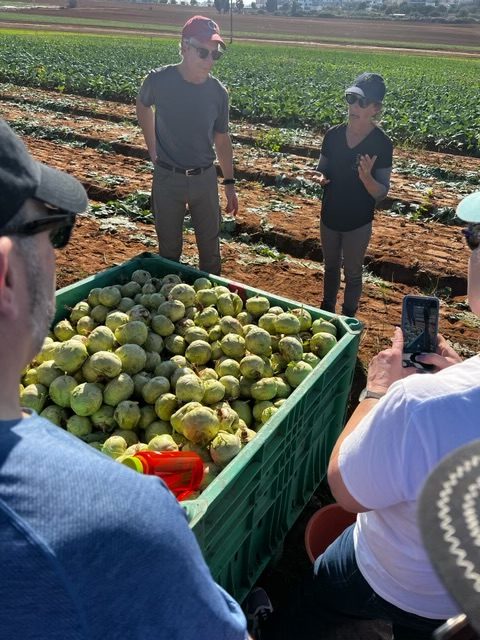
It is not a government organization, but privately subsidized, and uses volunteers from all over the world to help. We spent a couple of hours pulling the vegetable kohlrabi from the earth and collecting them in large bins. We farmed three rows of kohlrabi, extremely satisfying (although I’m not giving up my day job). Suddenly, the sirens sounded, and there we were in the middle of an open farm. We were asked to lay down on our stomachs and put our hands over our heads until the sirens stopped. We lay on the ground as we hear the iron dome explode the missiles that were heading towards Tel Aviv. There were no injuries from those missiles. When the sirens stopped. . .we went back to picking kohlrabi from the ground. That’s life in Israel — the sirens interrupt life. . .you do what you need to do. . .and then go back to your life. It’s humbling.
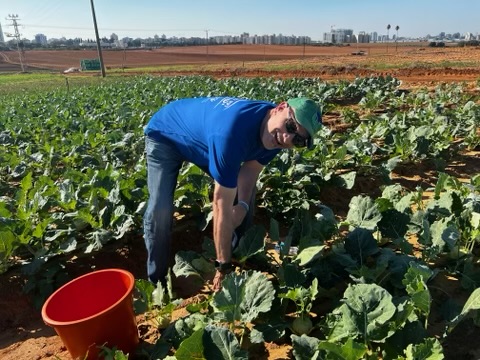
Lastly, we had the opportunity to hear from Yossi Klein HaLevi, an Israeli thinker, journalist, and writer who has been working with The Hartman Institute here in Jerusalem for years. He has especially been involved in Arab-Israeli conversations through Hartman (he indicated that many of those friendships through that collaboration have stopped due to this war). He has so many interesting things to say about what’s happening here in Israel. He had much to say. . .at this moment I will only share a couple of his insights. The first thing that really caught my mind is that that October 7 may have been the end of Zionism as we knew it. It used to be that outside of Israel was the most dangerous for the Jewish people, and that Zionism was the idea that Israel — the Jewish state — was the safest place in the world for Jews. October 7 shattered that idea, and that this war was actually to restore the covenant of the people with the government and with the armed forces. He stressed that this is an “existential war” for Israel. Not that Israel will be destroyed if it doesn’t defeat Hamas (which he says must be done — and 90% of the country agrees with that), but that if Israel doesn’t win this war, it may slowly begin the process of destruction. He does have hope, however, that after the war, a new government will come into power that will help to create more safety for Israel, and a place for the Palestinians to operate separately, but safely. The most curious thing he told us was that here in Israel they don’t see or spend much time thinking about the Gazan’s situation in Gaza, and that discussion of proportionality is light. . .the reason for that is that he said — “the people in the army are us, our children, and we know how we raised them, to be moral human beings.” The assumption here is that even the army is acting within the morality of Jewish values.”
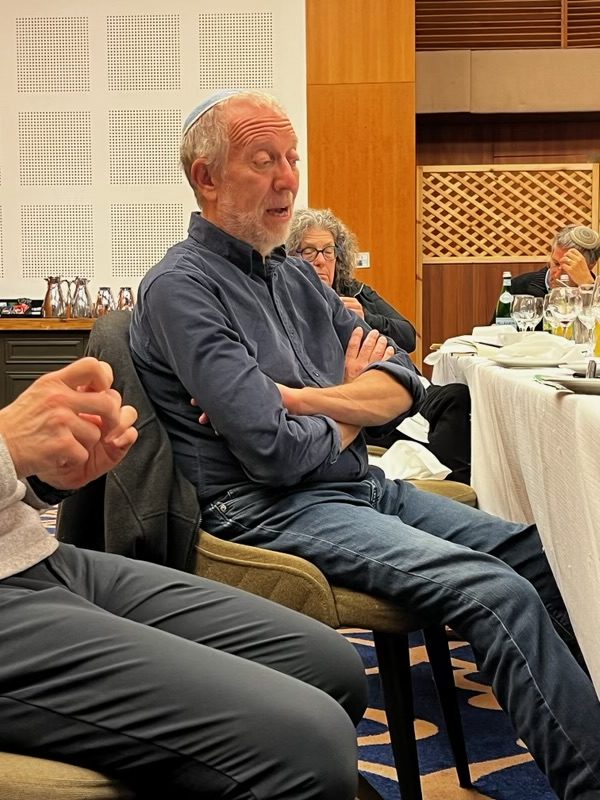
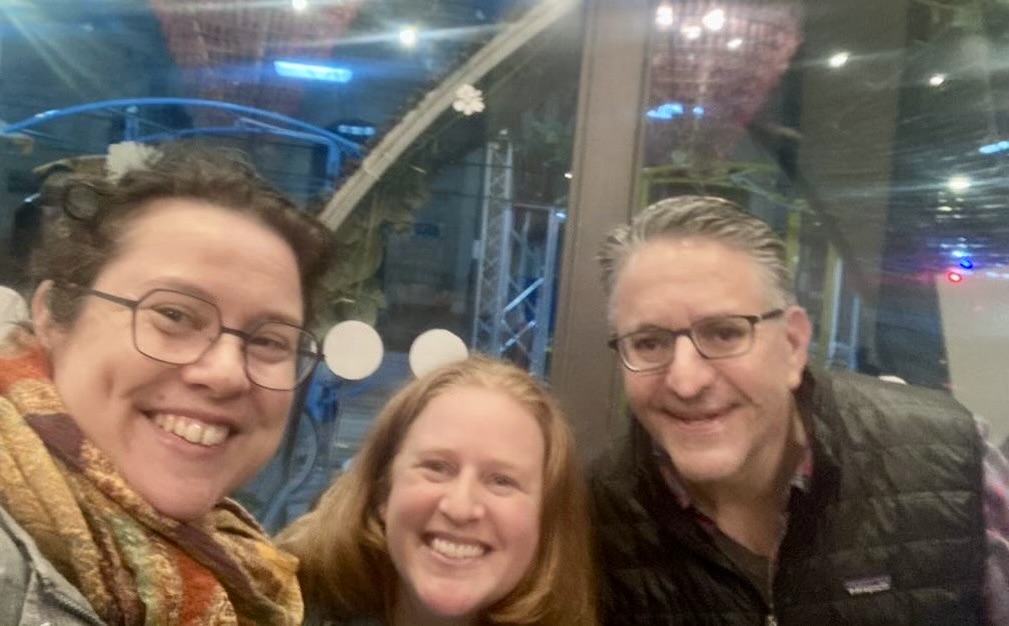
DAY 2: TODAY WAS ONE OF THE MOST EMOTIONAL DAYS OF MY LIFE. WE HEADED DOWN TO WHAT USED TO BE CALLED THE “GAZA ENVELOPE,” ALTHOUGH PEOPLE HERE HAVE STARTED TO CALL IT THE “SOUTHERN ISRAEL ENVELOPE” AND OTHER NAMES.
Kfar Aza
Our first visit was to Kfar Aza…the kibbutz literally on the border of Gaza (You can see how close in the picture…a fence yards from the kibbutz, and the wall separating Israel from Gaza less than 2 kilometers away). There were other groups with us in the kibbutz, and also many soldiers of all ages walking through these neighborhoods. Our guide mentioned that Israel was reticent to receive groups to the kibbutz – because perhaps it felt like people were doing it to go on a tragedy tour, out of curiosity, or something to check off. We felt like we were there to bear witness, and to better understand the magnitude of what the people of Israel endured on October 7. Even after seeing it, I don’t fully understand the terror they must have gone through. Our guide, a surviving member of the Kibbutz (of the 900-hundred-member kibbutz, 62 were killed, and 19 are missing or hostages). We walked through the young members’ living quarters (18-30), mostly single people or couples. They were the first area attacked, and the line of small houses is right on the edge of the kibbutz, closest to the fence. You can see the devastation in the pictures. Bullet holes, burnt out houses, an eerie silence (none of us spoke as we walked through the corridor between the homes). Personal items hanging, strewn over chairs, pots still on stoves, left as a reminder that those who left were not preparing to go. No building in this section was spared. Our guide described the tactics the Hamas terrorists used (I will not describe that here). He told us the first thing the terrorists did was attack the guards’ room – each kibbutz has a volunteer group who serve as protection. We continued walking through the kibbutz, and you could see where the IDF destroyed the houses where Hamas was hiding as the army came to battle the over 100 terrorists who overtook the kibbutz. We would pause occasionally, and he would point to a home, “That’s where my good friend Omer lived…here was where another of my close friends and his wife and child lived…” all murdered. We moved to another neighborhood where we were told about the randomness of the attack. In one house, a 65-year-old couple were murdered in their home…in the very next house, the entire family of four survived. He explained how there was no rhyme or reason as to why some survived, or some were murdered. There was the woman who openly negotiated with the terrorists to let her and her children survive, and then others who weren’t given the chance to speak at all. The most difficult part of walking through the kibbutz was seeing the traces of life left behind…a basketball hoop, a menorah (on the window, perhaps lit on this past Hanukkah to show that light can indeed pierce darkness), a sukkah still up, reminding us that this attack came on Simchat Torah. And then, as we walked between the homes: an orange tree, filled with ripe oranges that had not been picked off the branches. We picked and ate some of those sweet oranges…and it made me think that no matter what happens in the human world, nature continues on its course…those oranges didn’t stop growing because of the inhumanity and barbaric acts that took place there…I wish that we all could be like that…continue without being changed by what happened there…our tour of Kfar Aza ended with one of our participants sharing
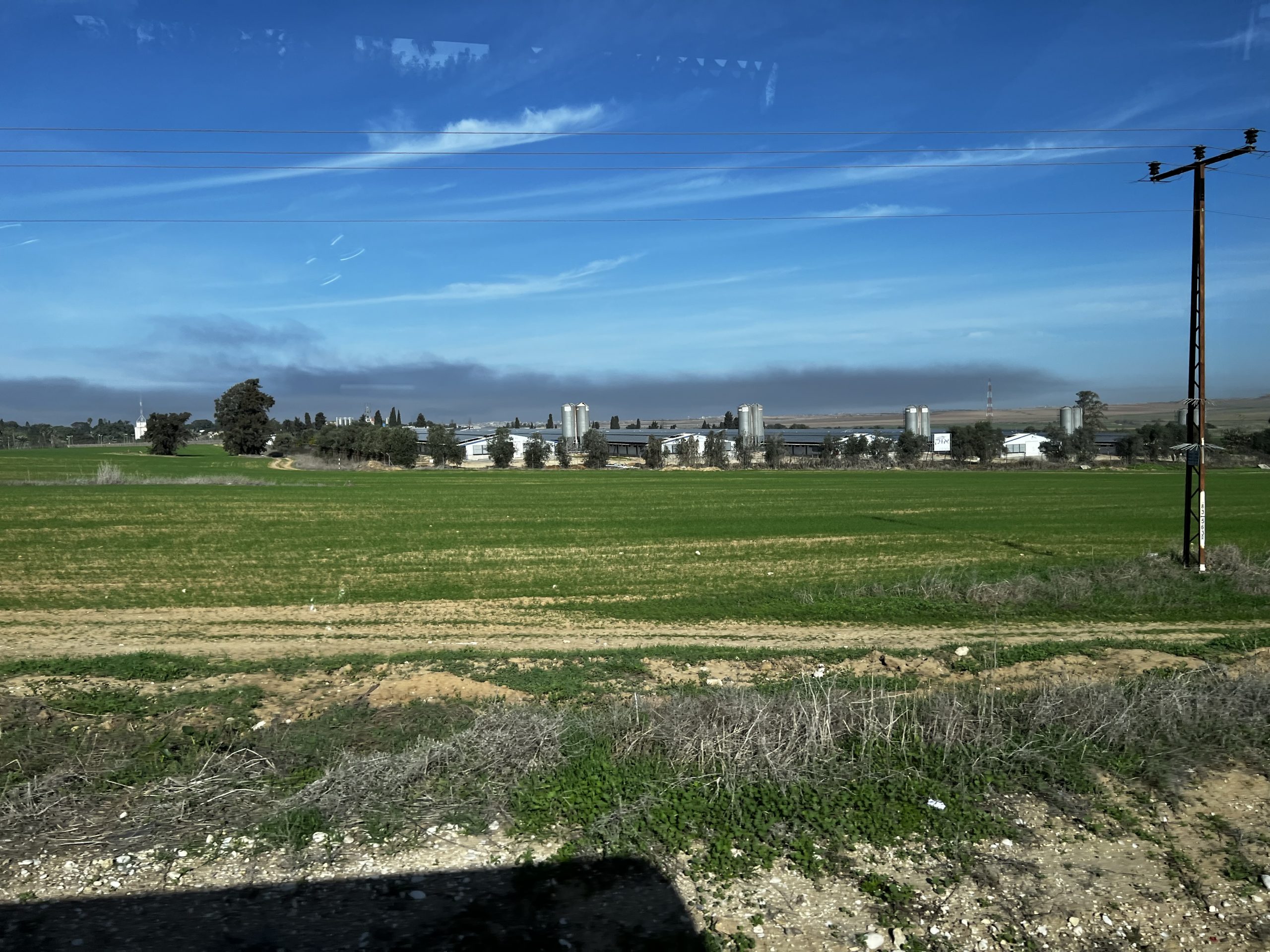 Netivot
Netivot
We moved on to Netivot, a town at the entrance to the War Zone…where we had lunch in the basement (the only “safe” place for a group to eat in the area) of Galgal Hozer, a center for kindness for residents and soldiers, working to give provisions to residents and soldiers, and provide them with mental health workers. The food for residents and soldiers is cooked by our host Herzl’s wife. Herzl, a sefardic Jew with kipa, big beard, and a constant smile on his face, who has a PhD in special needs education but spends his off time helping the downtrodden, the soldiers in the area, and anyone else that needs help. Many still live in Netivot, but many left as well. Hardly anyone was in the streets. Our next stop was to a nearby army post, where we met with soldiers (all of which were “milu-im” older soldiers who all had jobs in the “real” world… they weren’t kid soldiers, they were grown men and women with gray in the temples of their hair. We left some duffels of clothing with them, and I also gave them the letters from our congregation.
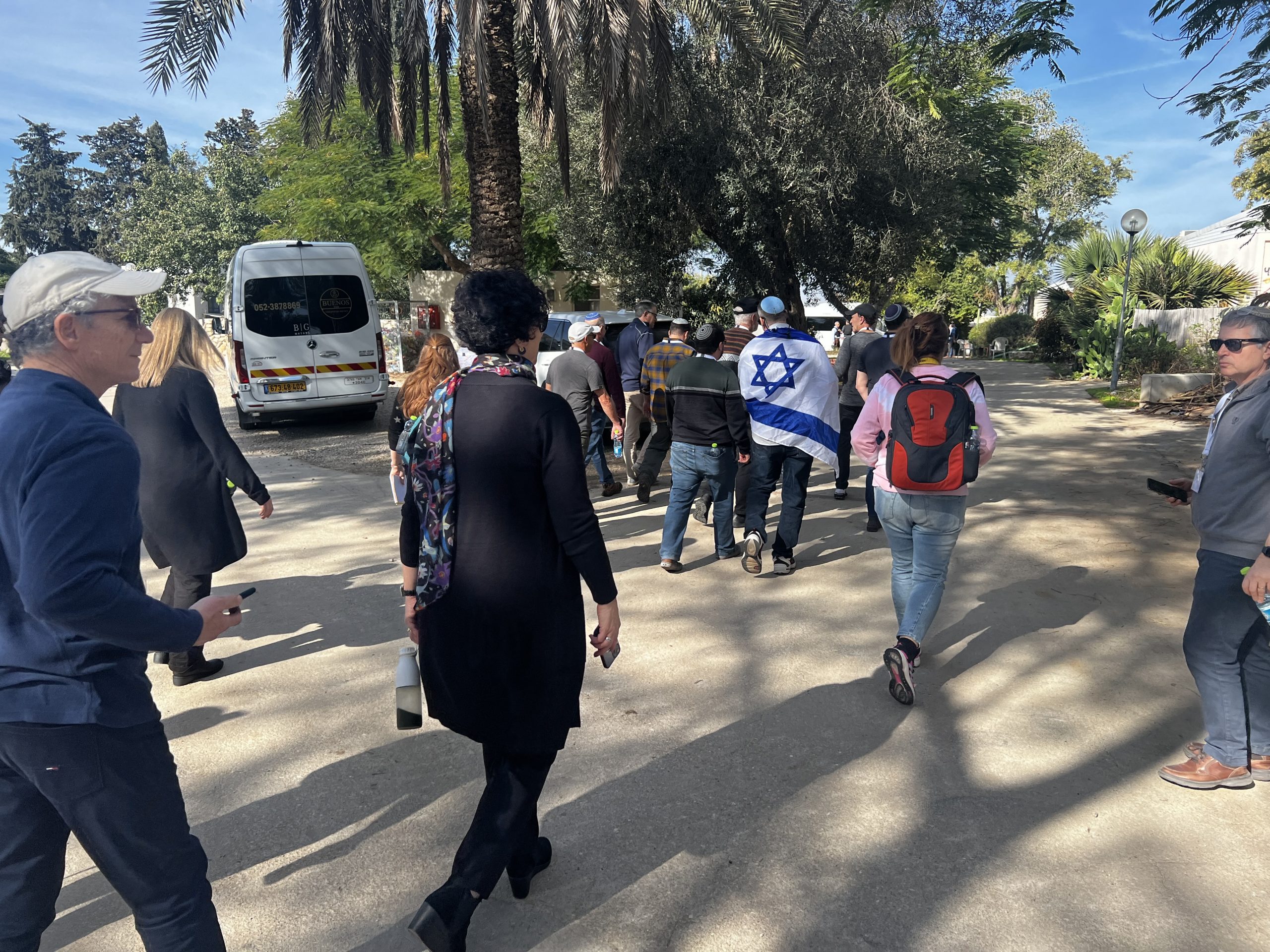 Sederot
Sederot
Our next stop was the town of Sederot…the largest town nearest the border. Hundreds of terrorists entered Sederot and went house to house murdering civilians. But it is most known for a battle that took place at the police station there. First, however, we met a rabbi of the local synagogue who told us the most incredible story. He arrived early to synagogue that morning, to prepare for Shabbat and Simchat Torah services. He hears noises outside, and goes out to see what was happening. He crosses the street and witness a battle between the police and Hamas. He decides he better go back inside, when all of the sudden, a sniper shoots him through the back and out the front, cracking a rib, and piercing a lung. He falls to the ground, gets back up and runs to the synagogue, where he finds a member of the synagogue, who says, “What’s going on?” He opens his blood stained shirt, and the man calls for an ambulance. The rabbi lays down and waits in the back of the synagogue for an ambulance that would never come – there he is on the floor of the synagogue, blood soaked clothing – and he asked God for the strength to survive. Soon, another members comes to the synagogue, grabs his car, pics him up at the back entrance of the shul, and brings him to the hospital…He brought us into the synagogue where his suit jacket with a hole in it was hanging on the left of the ark, and his shirt with a hole in it was to the right. He said that God gave him the strength to survive…from there we went to the police station. It was an empty lot. After hours of a battle with Hamas, where the terrorists entered and took over the station, the IDF blew up the building. No terrorists survived the attack. All that was left was an empty lot…in the corner of that lot were two Hanukkah menorahs, lit the week before on that spot…to show, once again, light can dispel darkness. We moved from there and watched security footage of the attack on the police station. Groups of terrorists shooting RPGs at the station, shooting into cars and killing the drivers of anyone passing by. One car whose driver was killed had two children in the back seat who survived. They sat in the middle of the road crouched down in the seat (here and there you could see their heads pop up). A non-uniformed officer risked his life running through the street to the car, and safely brought the children to safety. That officer raced back into the fray, and the person who showed us the video said he was killed in the fighting. So many stories of bravery, people risking their own lives to save others.
 Shura IDF Rabbinate Base
Shura IDF Rabbinate Base
Our last stop of the day was at the Shura IDF Rabbinate Base. This base is the main forensics center of the IDF, and it served as the coordination hub for identifying the murdered Israelis on October 7th and after. It is the hub where every fallen soldier of the IDF is brought to be identified, so that their bodies can be prepared, with honor and compassion, for burial. We were taken around by a young 30 something soldier who had no experience in this work before October 7th. This base is a Rabbinate base because all rituals concerning death and burial are under the auspices of the Rabbinate in Israel. He showed us the rooms where soldier and civilians are taken to be identified – through fingerprints, dental records, and also DNA samples. All of these are available for all citizens, because these records are kept from people’s time in the Army, which is most of the citizenry of Israel. We did learn that two soldiers were sent all the way to New Jersey to identify the DNA of two victims of the massacre whose remains made it impossible to identify. When they were asked, “why did you come all this way to identify just two people?” The soldier answered, “Because that is how much we care about respecting life. These people’s families need to know what happened to their loved one.” We moved then to a room with a slab in the middle of the room. This was the place where families could come and say goodbye to their fallen loved one. Our guide stressed that the work done in that building is holy work, and that room was the holy of holies – we all felt that in our souls. We were told that recently there had been a Russian/Israeli soldier, whose family sat with him in that room…just holding his hand and weeping…we all wept as well. Upon leaving that room, our guide from the tour, Ezra, told us he personally knew the soldier, and his family. In Israel, everyone is connected. Our final stop on the base was a room with the largest collection of Torahs in the world. The place where Torah scrolls are held and sent to the soldiers in the field. There in the room were “soferim” fixing the torahs so they could be used in the field. In one cabinet was a torah from the holocaust, and it had the same exact cover that we have for the holocaust Torah donated to Temple Emanuel by Edward Mosberg z”l around 6 years ago. The connection between this room and our chapel made me feel the strength of Torah as a unifying symbol that bonds every Jew together.
 In the evening we had dinner and a spiritual sharing of music, Torah, and togetherness with local Jerusalem rabbis who are a part of rashut-harabim, an umbrella organization for the renewal of Jewish life in Jerusalem. They work in partnership with more than 35 Israeli and Jewish institutions across religious denominations, it promotes pluralism, tolerance, and a city open to all. Three of the four clergy were ordained in the Reform movement in Israel, with the fourth rabbi part of the Conservative movement of Israel. We prayed for a shelter of peace, we prayed for the hostages, for the Israeli soldiers and for the State of Israel – at times, rabbis from our group, and the hosts offering insights and spiritual direction: to be present, to stay connected to each other, to hold compassion in our hearts for every life, every world lost, and to carry hope and goodness amidst the darkness. It was a moment to understand how the world holds both light and darkness at the same time, in every moment. So we ended our prayers with a song by Naomi Shemer, Al Kol Eileh (For All These Things), and 25 of us, in a circle of love and support, sang with full voice: “For all these things, for all these things, God please watch over them for me. Over the honey and the stinger, over the bitter and the sweet. Do not uproot what is planted, do not forget the hope, return me, and I will return, to the good land.”
In the evening we had dinner and a spiritual sharing of music, Torah, and togetherness with local Jerusalem rabbis who are a part of rashut-harabim, an umbrella organization for the renewal of Jewish life in Jerusalem. They work in partnership with more than 35 Israeli and Jewish institutions across religious denominations, it promotes pluralism, tolerance, and a city open to all. Three of the four clergy were ordained in the Reform movement in Israel, with the fourth rabbi part of the Conservative movement of Israel. We prayed for a shelter of peace, we prayed for the hostages, for the Israeli soldiers and for the State of Israel – at times, rabbis from our group, and the hosts offering insights and spiritual direction: to be present, to stay connected to each other, to hold compassion in our hearts for every life, every world lost, and to carry hope and goodness amidst the darkness. It was a moment to understand how the world holds both light and darkness at the same time, in every moment. So we ended our prayers with a song by Naomi Shemer, Al Kol Eileh (For All These Things), and 25 of us, in a circle of love and support, sang with full voice: “For all these things, for all these things, God please watch over them for me. Over the honey and the stinger, over the bitter and the sweet. Do not uproot what is planted, do not forget the hope, return me, and I will return, to the good land.”
THE THIRD AND FINAL DAY OF MY TIME TOGETHER WITH THE RABBI’S SOLIDARITY MISSION BEGAN IN JERUSALEM AT THE ORIENT HOTEL, WHERE WE MET WITH FOUR MEMBERS OF KIBBUTZ OR HANER, A KIBBUTZ COMMUNITY OF NEARLY 1,000 PEOPLE IN THE “ENVELOPE” WHERE THE TERRORISTS DID NOT ENTER DUE TO THE INTERNAL SECURITY FORCES OF THE KIBBUTZ ITSELF…
We also met with Omer Egozi, the associate director of the Israel Trauma Coalition, which now has an additional 1,000 new professionals in mental health capacities working to help with the communities who were most affected by the attack on October 7 (every single person in this country is affected by the situation in Israel – every single person I met is still in trauma over the events on that day and afterwards, but these displaced communities need specific help as they are refugees in their own country). Omer spoke about the new “Resilience Center” that was started, and how difficult it is to manage the hundreds of thousands who need mental health services. In Jerusalem alone there are over 25,000 evacuees staying at 63 hotels (one member of the kibbutz described it as a “refugee camp with a lobby”), and while you might think that they are comfortable staying at a hotel, they are not, and yearn for their kitchens and laundry and yards for the dog – they want to go home…but it is not safe to do so. The members of the kibbutz are trying to stay together as a community, and all spoke about the fact that they needed to stay together…the same sense of communal responsibility that was a part of their kibbutz was retained at the hotel. They volunteer to make sure that the children have education, the youngsters have play areas (there was a makeshift play area in front of the conference room where we met them, and I saw children playing there who looked just like the kids in our ECC – innocent, beautiful children who have no idea why they are there, “there were boom booms, so we had to come here” they were told). All of the women shared the trauma they are still experiencing. One woman said, “we live like we are on steroids all the time doing – don’t stop – because when we stop, we fall down.” One woman said they lost trust in the government being able to protect them, and they had also lost trust in the Arabs that worked on the kibbutz, who they treated like family and gave them work and food, “we brought them into our homes, how could they then do this?” The one line that was spoken is one that I hope can stay within their hearts, Tchelet said, “we don’t say that we will ‘bounce back,’ we say ‘bounce forward.’ Resilient indeed…
Hamal Hayerushalmi
Our next stop, still in Jerusalem, was with Adir Schwartz, a Jerusalem community leader and one of the founders of the center, Hamal Hayerushalmi, a Jerusalem Civil Coordination Center. Literally, on October 7th, Adir, who is one of the up-and-coming politicians in Jerusalem, began to coordinate (with his main political rival, with whom he has a lawsuit) the coordination center. They have three foci: The first is providing medical and tactical gear for the soldiers…the second is the evacuees – internally displaced people…and the third is the Jerusalem community (10% of the fallen soldiers are from Jerusalem, 20% of the injured). On day one, there were 100 volunteers, now there are thousands of volunteers in 20 departments. When they would hear there was a need (say, bathroom products), they would begin a department to tackle the area of need and begin to call for donations. There is a store called “Otef,” which is the same word as the war zone in the south that I mentioned earlier – which means, “envelope,” but here it has the meaning to embrace – to embrace the refugees and the communities in trauma that have real needs (especially those who left their homes so quickly without taking any of their belongings). The “store,” is a place for any refugee to come (it appears like a secondhand store) and take what they need AT NO COST. Others can come and receive clothing as well – and are asked to donate whatever they feel. We gave them some of the clothes we had brought from the states. He said that their core value is: Kavod ha-Adam, honor/dignity/respect of human beings. Cards are given out to the refugees entitled “Orech Kavod” “honored guest” which gives them discounts at 200 establishments connected with the organization. He told us that it’s easy for Israelis to feel alone, but they do not because of the support of American Jewry – he said, “we have brothers and sisters overseas that have our backs, we are one people, one destiny, and what is happening is the same war on many fronts.” His last words were incredible, and that he said he needed to say to us. He said that this story has 4 chapters in it. Chapter One: Hamas wrote that on October 7th. Chapter Two: the IDF is writing as they attempt to create safety in Israel without Hamas next door. Chapter Three: it is being written as we speak by the people of Israel through the Unity of Israel and the Jewish people (this is the chapter we have witnessed during our time here, every person we have met who is helping to make life better for everyone – have all been citizens and volunteers). Chapter Four: Tikkun. Re-creation and cooperation on the day after, to rebuild Israel and the Jewish future. With men like Adir entering the political arena, I actually am hopeful that the future Tikkun of the State of Israel, and the state of the Jewish people all over the world, is in very capable hands.
Avi Arielli
Lunch in Tel Aviv (there was a rocket attack and sirens which sounded over Tel Aviv as we were driving down from Jerusalem). We met with Avi Arielli, who was a senior agent with Shabak, Israeli Intelligence for 30 years. Born in Jerusalem, his family has been in the country for 200 years. He spoke to us about his relationship over the years with the United States, and how there is absolute cooperation between the two countries. One interesting comment he made was about the public pressure from the US on Israel. He mentioned that many times, what is said in public is not the same as what is said in private – you can take from that what you’d like. He also talked a little bit about the rockets from Gaza…since October 7th, there have been more than 12,000 rockets launched from Gaza towards civilian territory in Israel – 12,000 (in addition to the hundreds of thousands already launched since 2007 when Hamas took over Gaza), it is something you rarely hear about in the media’s reporting of the conflict. Interestingly, the Euro-Med Human Rights Monitor said in a press release that the Israeli army has admitted to bombing over 12,000 targets in the Gaza Strip. Without the Iron Dome, how many Israelis would have been killed? It appears like the world penalizes Israel because they protect their people, while Hamas encourages the death of their civilian population for political leverage.
Hostage Square
Our final stop of our mission was at “Hostage Square” next to the Tel Aviv Museum. There we met with the Hostages and Missing Families Forum, which is the main body working to BRING THEM HOME (https://stories.bringthemhomenow.net, here you can purchase dog tags – says in Hebrew “our hearts are prisoners in Gaza ”, shirts, pins, all the money stays within the organization – there are no professionals working on this project – ALL volunteers). There we met with Dani, the father of Omri Miran, who is a hostage in Gaza. Dani told us his story, how he spoke with his son the morning of October 7th, when his son told his father not to worry, “it’s only another rocket siren.” Later, of course that changed, and Omri with his wife and two daughters were taken by Hamas to another home, where two families were told to sit on the floor in the middle of a home. The terrorists said to the men, “you men come with us, or all of you die.” The men stood, hands tied behind their backs, and taken into Gaza. His wife and two daughters are safe. He thanked us for being there and for supporting the organization pushing the government to work as hard as they can to bring all of the hostages home. He ended his talk with us by looking at all of our faces and asking, “why do you all look so sad? Don’t be that way, we must live with hope, and continue our lives.”
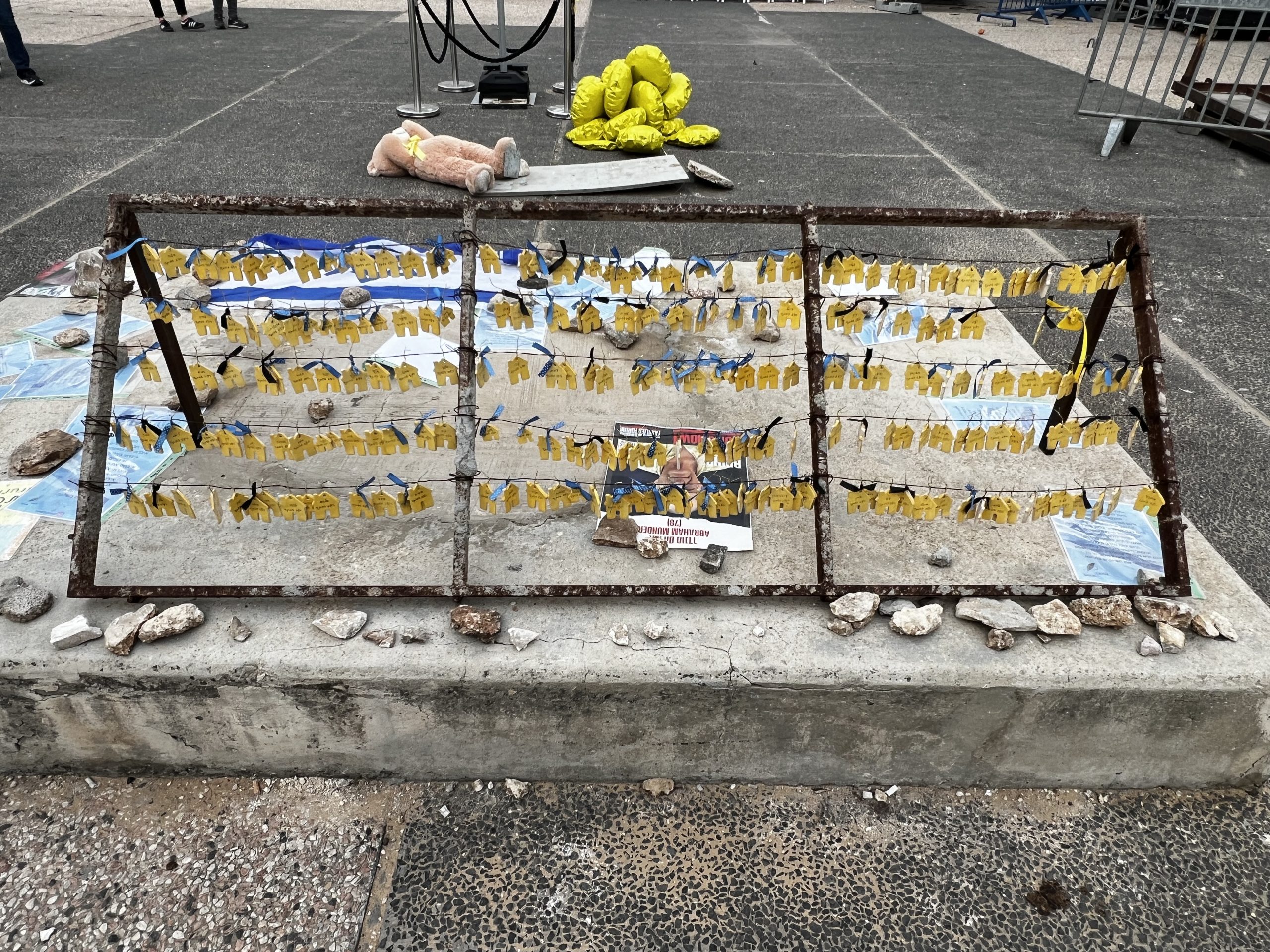 That final message seemed to be the theme of the day…it’s not about bouncing back to the way it was, but to bounce forward toward the future…Our tikkun is to re-create and build…If we can, find a way to smile and live life with a gratitude for being alive and able to help others.
That final message seemed to be the theme of the day…it’s not about bouncing back to the way it was, but to bounce forward toward the future…Our tikkun is to re-create and build…If we can, find a way to smile and live life with a gratitude for being alive and able to help others.
Epilogue:
These three days that I spent with the group were incredibly emotional and intense. Everywhere we went, and everyone we met were so inspirational, living life to help others, living life to move forward, protecting the people of the State of Israel who have been attacked (from the South and from the North – let us not forget the rocket attacks from Hezbollah), and each one spoke of the hope for the future. I will never forget the resiliency of the people, the compassion of the volunteers, the trauma that is found on the face of every single Israeli.
Then came Shabbat…I spent that with my family here. First, I arrived in Mevuseret Tzion just before sundown, where my cousin Eran met me in front of his house and declared, “we have to go to the Beit Kinesset for Minchah. I accompanied him to the Sefardi synagogue in the neighborhood, which is a beautiful building with light and windows. He took 3 siddurim from a cabinet (for me, him, and his 13 yr. old son, Sagi), we entered and sat in the back. I recognized none of the Sephardic melodies, but the prayers were the same as we read in Beverly Hills (although many more than we typically do – and read a lot faster). I was filled with the sense that I belonged there, even though I was a foreigner, even though I didn’t know the melodies, but everyone singing so loud – I closed my eyes and smiled. I needed to be in a place that sang of praise, peace, and thankfulness. We returned to the same home I had Shabbat dinner so many times during my year in Israel back in 1990. We talked about what was happening, we ate, we laughed about moments we shared 30 years ago, and I felt the joy of connection with family. Shabbat morning, I had a visit from Alexi Rosenfeld, who grew up attending our ECC and Day School, and who now is a photojournalist for Getty Images. He was among the first press allowed into Kibbutz Aza, Beeri, and other areas of the massacre to be a photo witness to the atrocities that happened there. He is a talented photographer, and you can see his images on his Instagram page (Alexi Rosenfeld). He was in Israel for a wedding during Sukkot – took a flight on the 6th of October, landed in New York (when he said everyone’s phone started pinging, and people realized what had been happening in Israel just hours after they left), was called by his editor at Getty Images, and immediately returned to Israel that evening. We spent the morning together. Then I spent the rest of Shabbat in Raanana with other cousins, the Kfir family. Elisheva and Moshe attended our seders in the 80s with their 3 children (now they have 5), when they lived in New Jersey for 12 years. Their daughter Tamar and her fiancé Daniel were there, and, again, we spent most of the time reminiscing and discussing the situation in Gaza (that is really all anyone can talk about right now – and I was the same way), but we also ate together, discussed the upcoming wedding, and other things not related to Gaza. Daniel is a pianist and at the end of my visit, played some Bach and Chopin on the piano. It was a beautiful way to end Shabbat.
Today, I leave for home, but a part of my heart will remain here with my family, the people I met on our visit, and rabbis who shared time and tears and prayers together. Am Yisrael Chai, the people of Israel endure.
FINAL THOUGHTS ON MY TRIP TO ISRAEL AS I WAIT IN THE AIRPORT FOR MY PLANE…
Before I left for the short, intense, solidarity mission with 20 rabbis from all over the United States and Canada organized by American Rabbi Misha Zinkow and Israeli Ezra Korman and Makor Educational Journeys, everyone asked me the same question: Are you afraid to go? I always answered, “No, I’m not afraid…I’m a little anxious about the emotions I will feel…but afraid? Not to be in Israel.” I was right on both counts…there was not a single moment of fear…not when the sirens sounded, not when I heard the explosions of mortar from Gaza, 3 kilometers from the kibbutz where we were standing, or even the loud BOOM set off every 10 minutes or so in Kibbutz Aza to remind Hamas that if they were thinking of returning, people are here and ready. I was the opposite of scared when I saw young soldiers walking in the streets in uniform and armed with machine guns. I wasn’t scared when I walked alone at any time during my stay here. I have always felt incredibly safe in Israel, even 33 years ago when I had to shelter in sealed rooms with a gas mask. But my emotions were indeed tapped. My eyes remained puffy throughout the time we visited the many locations we did – and even now as I write this, tears well up in my eyes. I love Israel, I love the people here, the culture and the feeling, the Jewish stars and menorahs and Israeli flags adorning buildings and street corners, as ubiquitous as Christmas lights and American flags in our country. Huge posters all over the country with phrases like “Together we will be victorious” and “bring home the hostages now” on buildings and highway overpasses, and two Israeli flags on every street lamp on the highway. “Shabbat Shalom” is said as you pass strangers on the street and in the hotel, and on Saturday night, the DJ on the radio comes on after a song and says, “Shavua Tov” before moving on to the next song. It’s difficult to explain, but easy to feel: this is the one place in the world that being Jewish is the norm.
This week I saw and heard things that were not easy to see and hear. I walked in places that are now holy due to the souls who were lost and stolen from this world. Part of the reason we were here was to witness what happened. But a more important reason was to show the people here that they are not alone. That we love them, we care what happened here, and we want them to know that just because we live in North America – first and foremost, we are a part of the people Israel, and when our people are hurting, we are hurting. Every single Israeli that we spoke to was touched by the presence of this group of Reform Rabbis displaying solidarity with them – they thanked us for being there. They were experiencing arguably the worst trauma of our people in the last 75 years, and they thanked us. One put it meaningfully, “…you can pretend to care, but you cannot pretend to show up.” But really, I feel like being there for them nourished our souls as much as it touched theirs.
Music and prayer have been a central aspect of my own spiritual expression for my entire life. Three moments of song/prayer stand out as indelible moments from this trip. The first was that moment at Kfar Azza, right after we witnessed the aftermath of the despicable massacre that took place there – we sang Psalm 34, as the Psalmist wrote so beautifully (words that adorn my tallit), “Who is the one who is eager for life, who loves each day and is able to see the good.” Even as the worst has happened, we witnessed a people who is still eager to live, and to see the good in this world. The second is a teaching from Rabbi Shani Ben Or, one of the rabbis who led our prayer circle, she taught that even though we strive for peace, it only can come after we find strength. We sang this at our final meeting together as a group: “Adonai will grant strength to the people, Adonai will bless the people with peace.” And finally, there was a spontaneous moment after we met with the father of one of the hostages, Dani Miran, whose son, Omri, is still among the more than 100 hostages in Gaza . We jumped up and formed a circle and someone started to sing Rebbe Nachman’s words. “The whole world is a narrow bridge, the main thing is not to be afraid.” This country, the Jewish nation, and the Jewish people, have endured the worst kinds of atrocities against us…over and over, throughout our history. October 7th, we add another moment in history that will remain in the Jewish conscience for an eternity. It will take its place next to other moments of violence and hatred towards our people. It can make us all feel as if we are on this narrow bridge that moves us from where we were to where we will be, and we may need to move slowly so as not to fall off, but next to you is your brother, next to you is your sister, your mother and father, your grandparents, and all the generations of our people who have endured it before you. We cannot be afraid. We must be proud to be who we are. We need to show each other that we are here for each other. And we can never let it make us so afraid that we lose sight of the enduring promise of peace that we pray for every single day. Adonai Oz l’amo yiteyn, Adonai yivarech et amo vashalom. God will grant strength to the people, God will bless the people with peace.
Ken y’hi ratzon – may it be so



